| |||||||||
| Decades: | |||||||||
|---|---|---|---|---|---|---|---|---|---|
| See also: | |||||||||
The following lists events that happened during 1850 in South Africa .
| |||||||||
| Decades: | |||||||||
|---|---|---|---|---|---|---|---|---|---|
| See also: | |||||||||
The following lists events that happened during 1850 in South Africa .
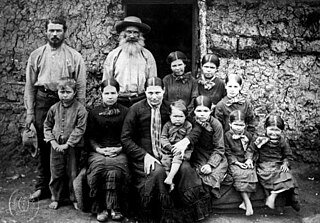
Boers are the descendants of the proto Afrikaans-speaking Free Burghers of the eastern Cape frontier in Southern Africa during the 17th, 18th, and 19th centuries. From 1652 to 1795, the Dutch East India Company controlled the Dutch Cape Colony, which the United Kingdom incorporated into the British Empire in 1806. The name of the group is derived from Trekboer then later "boer", which means "farmer" in Dutch and Afrikaans.

The Cape Colony, also known as the Cape of Good Hope, was a British colony in present-day South Africa named after the Cape of Good Hope. It existed from 1795 to 1802, and again from 1806 to 1910, when it united with three other colonies to form the Union of South Africa, then became the Cape Province, which existed even after 1961, when South Africa had become a republic, albeit, temporarily outside the Commonwealth of Nations (1961–94).

The Union of South Africa was the historical predecessor to the present-day Republic of South Africa. It came into existence on 31 May 1910 with the unification of the Cape, Natal, Transvaal, and Orange River colonies. It included the territories that were formerly part of the South African Republic and the Orange Free State.
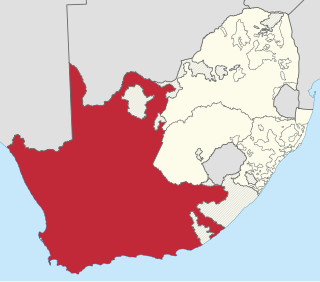
The Province of the Cape of Good Hope, commonly referred to as the Cape Province and colloquially as The Cape, was a province in the Union of South Africa and subsequently the Republic of South Africa. It encompassed the old Cape Colony, as well as Walvis Bay, and had Cape Town as its capital. In 1994, the Cape Province was divided into the new Eastern Cape, Northern Cape and Western Cape provinces, along with part of the North West.
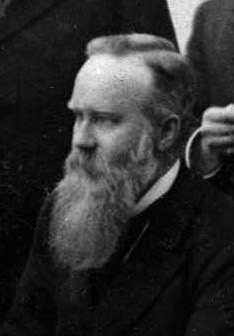
Abraham Fischer was a South African statesman. He was the sole Prime Minister of the Orange River Colony in South Africa, and when that ceased to exist joined the cabinet of the newly formed Union of South Africa.

Khoekhoe are the traditionally nomadic pastoralist indigenous population of South Africa. They are often grouped with the hunter-gatherer San peoples. The accepted term for the two people being Khoisan. The designation "Khoekhoe" is actually a kare or praise address, not an ethnic endonym, but it has been used in the literature as an ethnic term for Khoe-speaking peoples of Southern Africa, particularly pastoralist groups, such as the Griqua, Gona, Nama, Khoemana and Damara nations. The Khoekhoe were once known as Hottentots, a term now considered offensive.

Hopetown is a town which lies at the edge of the Great Karoo in South Africa's Northern Cape province. It is situated on an arid slope leading down to the Orange River. The first diamond discovered in South Africa, the Eureka Diamond, was found at Hopetown.

The Cape Corps and its predecessor units were the main military organisations in which the Coloured members of South Africa's population served.
The following lists events that happened during 1803 in South Africa.

British Kaffraria was a British colony/subordinate administrative entity in present-day South Africa, consisting of the districts now known as Qonce and East London. It was also called Queen Adelaide's Province and, unofficially, British Kaffiria and Kaffirland.

Transnet Freight Rail is a South African rail transport company, formerly known as Spoornet. It was part of the South African Railways and Harbours Administration, a state-controlled organisation that employed hundreds of thousands of people for decades from the first half of the 20th century and was widely referred to by the initials SAR&H. Customer complaints about serious problems with Transnet Freight Rail's service were reported in 2010. Its head office is in Inyanda House in Parktown, Johannesburg.
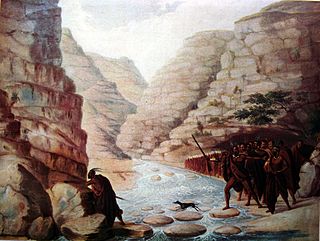
The Xhosa Wars were a series of nine wars between the Xhosa Kingdom and the British Empire as well as Trekboers in what is now the Eastern Cape in South Africa. These events were the longest-running military resistance against European colonialism in Africa.

Charles Davidson Bell FRSE was a Scottish-born artist who spent the majority of his life in the Cape Colony. In addition to serving as the Surveyor-General of the colony, he was also a heraldist who designed several of the Cape Colony's medals and stamps.
Afrikaners are a Southern African ethnic group descended from predominantly Dutch settlers first arriving at the Cape of Good Hope in 1652. Until 1994, they dominated South Africa's politics as well as the country's commercial agricultural sector.

The economy of the Western Cape in South Africa is dominated by the city of Cape Town, which accounted for 72% of the Western Cape's economic activity in 2016. The single largest contributor to the region's economy is the financial and business services sector, followed by manufacturing. Close to 30% of the gross regional product comes from foreign trade with agricultural products and wine dominating exports. High-tech industries, international call centres, fashion design, advertising and TV production are niche industries rapidly gaining in importance.
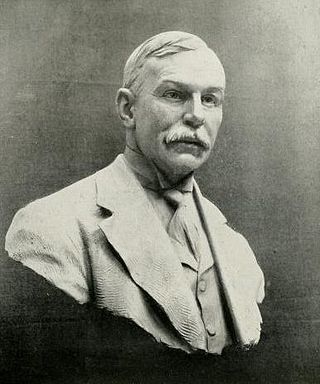
Sir Richard Solomon, was a South African attorney and legislator. He was a member of Parliament and the Attorney General of the Cape Colony and Attorney General, Lieutenant-Governor, and Agent-General of the Transvaal Colony. After serving as Agent-General of the Transvaal from 1907 to the creation of the Union of South Africa in 1910, Solomon was the first High Commissioner of South Africa to the United Kingdom to his death in 1913.

John Blades "JB" Currey (1829–1904) was Colonial Secretary to the Government of Griqualand West and an influential businessman and politician of the Cape Colony.

In the Colonies and former Boer Republics which became the Union of South Africa in 1910, several unofficial military decorations and medals were instituted and awarded during the nineteenth and early twentieth century. Sir Harry Smith's Medal for Gallantry is an unofficial military decoration for bravery, awarded for actions following the siege of Fort Cox in December 1850, at the beginning of the 8th Cape Frontier War. The medal was privately instituted in 1851 by Major General Sir Henry George Wakelyn Smith Bt GCB, at the time the Governor and Commander-in-Chief of the Cape of Good Hope.

The Queen Victoria Mosque, also called the Jamia Mosque, is a mosque, situated at the corner of Chiappini and Castle street, in Cape Town, South Africa. It is considered to be the first and oldest mosque in Cape Town, and the largest in the Bo-Kaap area of Cape Town. The mosque is a National heritage site.
See Years in South Africa for list of References